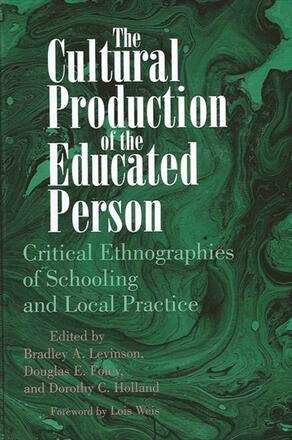
The Cultural Production of the Educated Person
Critical Ethnographies of Schooling and Local Practice
Alternative formats available from:
Examines the ways in which cultural practices and knowledges are produced in and out of schools around the world.
Description
Eleven historical-ethnographic case studies examine the social and cultural projects of modern schools, and the contestations, dramatic and not, that emerge in and around and against them. These case studies, ranging from Taiwan to South Texas, build upon an original joining of anthropology, critical education theory, and cultural studies. The studies advance the concept of cultural production as a way of understanding the dynamics of power and identity formation underlying different forms of "education." Using the concept of the "educated person" as a culture-specific construct, the authors examine conflicts and points of convergence between cultural practices and knowledges that are produced in and out of schools.
Bradley A. Levinson is Assistant Professor of Anthropology at Augustana College. Douglas E. Foley is Professor of Education and of Anthropology at the University of Texas-Austin. He is the author of From Peones to Politics; Learning Capitalist Culture; and The Heartland Chronicles: A Tale of Mesquaki-White Relations. Dorothy C. Holland is J. Ross Macdonald Professor of Anthropology at the University of North Carolina, Chapel Hill. She is coeditor of Cultural Models in Language and Educated in Romance: Women, Achievement, and College Culture.
Reviews
"Those of us who do critical ethnographic research must be willing to move across national and international borders to probe further the meaning of our conceptions of schooling as related to the economy, society, and culture. Levinson, Foley, and Holland are the first to my knowledge to put together a volume that takes seriously the global dimensions of issues under consideration in critical cultural studies. The authors specifically probe issues of cultural production in a wide variety of economic and cultural contexts, making a major contribution to the literature. The essays span Taiwan, Ecuador, Mexico, Bolivia, the U.S., and Nepal. The potential for engaging with these essays in a variety of ways is truly exciting and I urge readers to work across essays in order to probe theoretical issues of importance." -- From the Foreword by Lois Weis
"There is a paucity of comparative anthropological work in this area. This international approach to cultural production is much needed." -- Erwin Epstein, Ohio State University